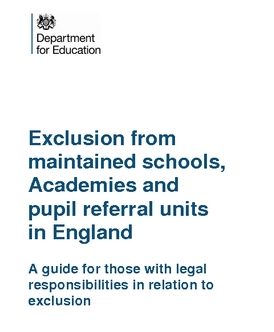
SENDIASS Torbay provides information, advice and support when a child or young person with special educational needs and/or disabilities (SEND) is excluded from school, or is at risk of exclusion. The SENDIASS service is free, confidential and impartial. Here we have compiled an overview to school exclusions from the Independent Provider of Special Educational Advice (IPSEA) and a link to the statutory guidance on school exclusions. You can download the guidance.
Children with special educational needs and/or disabilities are much more likely to be excluded from school than their classmates.
Only the head teacher of a school (or the teacher in charge of a pupil referral unit or the principal of an academy) can exclude a pupil. There are only two types of exclusion from a school which are lawful: permanent and fixed-period.
This means that legally a pupil is either in school full-time or they are excluded from school. They can be excluded for a fixed term (for a specific number of school days) or permanently excluded. Any exclusion of a pupil, even for a short period of time, must be formally and accurately recorded.
Pupils can only be excluded for disciplinary reasons: they cannot be excluded because a school, pupil referral unit (PRU) or academy cannot meet their needs or for something which their parents did or did not do.
‘Informal’ or ‘unofficial’ exclusions, such as sending a pupil home to cool off or the school putting a pupil on a ‘part-time timetable’, are all unlawful regardless of whether they occur with the agreement of parents or carers. See what steps the school has to take in order for the exclusion to be lawful. Too many children and young people with SEN and disabilities are excluded illegally.

Unlawful exclusion of a pupil with a disability may amount to disability discrimination under the Equality Act 2010.
The statutory guidance around school exclusions is found at https://assets.publishing.service.gov.uk/government/uploads/system/uploads/attachment_data/file/641418/20170831_Exclusion_Stat_guidance_Web_version.pdf
Fixed term for up to five days
- The Head must write immediately giving length and reason for exclusion.
- The Head must inform the Governors and LA only if an external exam or National Curriculum test would be missed or if the total days excluded in that term are more than 5. (The maximum number of days in a school year for which a child can be given fixed-term exclusions is 45.)
- The Governors must meet only if:
- an external exam or National Curriculum test would be missed or
- the total days excluded in that term is over 5 and parents ask for a meeting.
- If there is a meeting, parents have the right to attend.
- Parents have the right to make ‘written representations’ which must be considered by governors even where there is no requirement for a meeting (see IPSEA’s advice on preparing written representations for more information).
- School must take reasonable steps to set and mark work for the first five days of a period of exclusion.
- School or LA may ask parent to sign a Parenting Contract or apply to Magistrates’ Court for a Parenting Order.
Entitlement to alternative education
The statutory guidance ‘Exclusion from maintained schools, academies and pupil referral units in England’ says that whilst the statutory duty on governing bodies or local authorities is to provide full-time education from the sixth day of an exclusion, there is an obvious benefit in starting this provision as soon as possible. In particular, in the case of a looked after child, schools and local authorities should work together to arrange alternative provision from the first day following the exclusion.
The guidance goes on to say that where it is not possible, or appropriate, to arrange alternative provision during the first five school days of an exclusion, schools should take reasonable steps to set and mark work for pupils. Work that is provided should be accessible and achievable by pupils outside of school.
You can find further advice on what to do if your child is excluded here.
Fixed term for between five and 15 days
- The Head must write immediately giving length and reason for exclusion.
- The Head must inform the Governors and LA.
- The Governors must meet only if
- an external exam or National Curriculum test would be missed or
- the total days excluded in that term is over 15 or
- the total is between 5 and 15 and parents request a meeting.
(Note that the maximum number of days in a school year for which a child can be given fixed-term exclusions is 45.)
- Parents have the right to make ‘written representations’ which must be considered by governors and to attend any meeting if parents request it (see IPSEA’s advice on preparing written representations for more information).
- School must take reasonable steps to set and mark work for the first five days of a period of exclusion and alternative provision must be arranged from the sixth day.
- School or LA may ask parent to sign a Parenting Contract or apply to Magistrates’ Court for a Parenting Order.
Entitlement to alternative education
For a fixed-period exclusion of more than five school days, the governing body (or local authority in relation to a pupil excluded from a pupil referral unit) must arrange suitable full-time education for any pupil of compulsory school age. This provision must begin no later than the sixth day of the exclusion.
Fixed term for over 15 days
- The Head must write immediately giving length and reason for exclusion.
- The Head must inform the Governors and LA.
- The Governors must meet within 15 days of receiving the notice of the exclusion (NB if the exclusion will result in the pupil missing an external or National Curriculum exam they must take reasonable steps to meet before the exam).
- Parents have the right to make ‘written representations’ which must be considered by governors and to attend the meeting (see IPSEA’s advice on preparing written representations for more information).
- School must take reasonable steps to set and mark work for the first five days of a period of exclusion and alternative provision should be arranged from the sixth day
- School or LA may ask parent to sign a Parenting Contract or apply to Magistrates’ Court for a Parenting Order.
Entitlement to alternative education
For a fixed-period exclusion of more than five school days, the governing body (or local authority in relation to a pupil excluded from a pupil referral unit) must arrange suitable full-time education for any pupil of compulsory school age. This provision must begin no later than the sixth day of the exclusion.
Permanent exclusions
- The Head must write immediately explaining that the exclusion is permanent and giving the reason for the exclusion
- The Head must inform the Governors and LA. If the pupil lives outside the local authority in which the school is located, the head teacher must also advise the ‘home authority’ of the exclusion without delay
- The Governors must meet within 15 days of receiving the notice of exclusion (NB if the exclusion will result in the pupil missing an external or National Curriculum exam they must take reasonable steps to meet before the date of the exam) and parents have the right to attend
- Parents have the right to make ‘written representations’ which must be considered by governors (see IPSEA’s advice on preparing written representations for more information)
- LAs are required to arrange educational provision for excluded pupils of compulsory school age from all institutions from the sixth day of a permanent exclusion
- Where parents (or the excluded pupil if aged 18 or over) dispute the decision of a governing body not to reinstate a permanently excluded pupil, they can ask for this decision to be reviewed by an independent review panel (see below for an explanation of how this works)
- The school or LA may ask parent to sign a Parenting Contract or apply to Magistrates’ Court for a Parenting Order.
What is an independent review panel?
Where parents dispute the decision of a governing board not to reinstate a permanently excluded pupil, they can ask for this decision to be reviewed by an independent review panel. An independent review panel does not have the power to direct a governing board to reinstate an excluded pupil. However, where a panel decides that a governing board’s decision is flawed when considered in the light of the principles applicable on an application for judicial review, it can direct a governing board to reconsider its decision.
Whether or not a school recognises a pupil as having SEN, all parents have the right to request the presence of an SEN expert at a review meeting. The SEN expert’s role is to advise the review panel, impartially, of the relevance of SEN in the context and circumstances of the review. For example, they may advise whether the school acted reasonably in relation to its legal duties when excluding the pupil.
Entitlement to alternative education
For permanent exclusions, it is the local authority (and not the school) which must arrange suitable full-time education for the pupil to begin no later than the sixth day of the exclusion. This will be the pupil’s ‘home authority’ in cases where the school is maintained by (or located within) a different local authority.
‘Full-time’ means supervised education equivalent to that provided by mainstream schools.
You can find further advice on what you should do if your child is excluded, including ensuring alternative education is provided, here.
Getting temporary education put in place
Under Section 19 of the Education Act 1996, the LA has a legal duty to secure suitable, full-time alternative education for those children of compulsory school age who, by reason of illness, exclusion or otherwise, may not for any period receive suitable education unless such arrangements are made for them.
This education must be full time unless, for reasons relating to the physical or mental health of the child, a reduced level of education would be in the child’s best interests.
It must also be suitable to the child’s age, ability, aptitude and any special educational needs.
Compulsory school age begins with the start of term following a child’s fifth birthday and ends on the last Friday in June in the academic year in which s/he turns 16.
How to request alternative education
Write to the Director of Children’s Services at your LA and request that they provide suitable alternative full-time education for your child whilst he or she is out of school. In your letter or email, you should include
- your child’s name, age and school
- details of the circumstances which have led to your request
- the date by which the LA will have a duty to provide full-time education for your child:
- exclusions: from the sixth school day after the exclusion
- health needs/anxiety: as soon as it is clear that the child will be away from school for 15 days or more, whether consecutive or cumulative, and at the latest by the sixth day of the absence
- children with no school place: immediately
- copies of any supporting evidence (e.g. an exclusion letter from the head teacher, or a letter from your GP or other medical or mental health practitioner)
- details of your child’s SEN and of the provision that will be required in order for the alternative education provision to be suitable
- if your child has an EHC Plan, attach a copy and ask for details of how the LA will ensure that the special educational provision continues to be delivered while he or she is out of school in accordance with section 42, Children and Families Act 2014.
Keep a copy of your letter so that you have a record of your contact with the LA.
Complaints
If, despite a request to do so, the LA has not made any suitable arrangements for alternative education for a child who cannot attend school, they will be in breach of their statutory duties and you could consider making a complaint.
The Local Government Ombudsman has repeatedly highlighted the duty to provide alternative education.
Case law
The Courts have confirmed the LA has a duty to provide education for all children of compulsory school age who are out of school.
R v East Sussex County Council, Ex p Tandy / In re T (A Minor) [1998] 2 WLR 884: The LA is under an absolute duty to provide suitable education for children who are out of school due to illness, exclusion or otherwise. An LA may not take its own financial constraints into account when assessing what is an appropriate education.
R (on the application of Y) v Croydon LBC [2015] EWHC 3033 (Admin); [2016] E.L.R. 138: The mother of a severely learning-disabled child had been unable to get him to attend school despite significant efforts. The LA refused to change the school named in the Statement or provide other alternative education. The LA was found to be in breach of its duty under s. 19 Education Act 1996 to provide suitable education; as no further plan had been put forward, it was not reasonably practicable for the child to attend that school.
